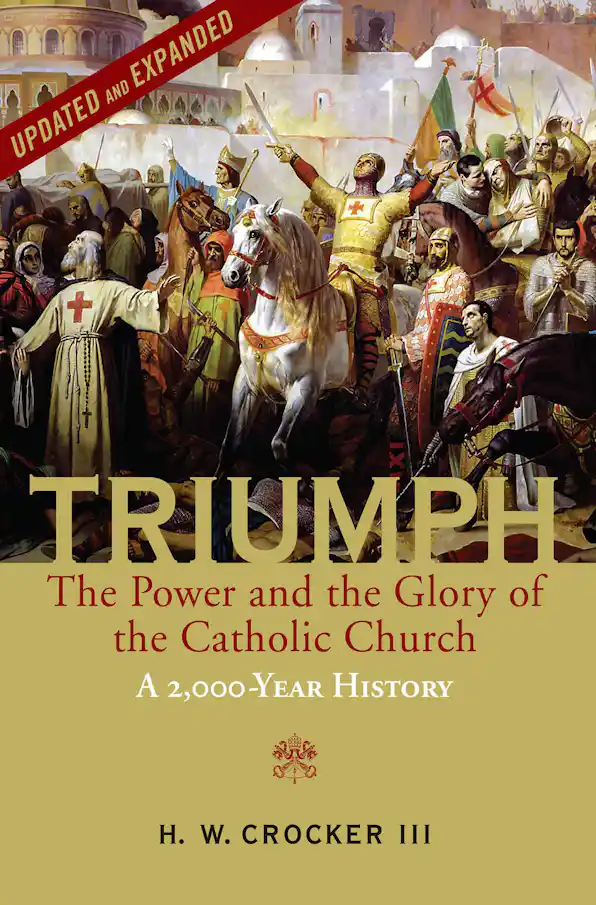- Feb 5, 2002
- 166,616
- 56,250
- Country
- United States
- Faith
- Catholic
- Marital Status
- Married
- Politics
- US-Others
There’s a great line by St. John Henry Newman that Catholic apologists like to quote, particularly in debates with Protestants: “To be deep in history is to cease to be Protestant.” Among the strongest reasons to become Catholic is realizing how the Church continued to exist and thrive over the course of over two millennia, making it the oldest continuous institution on the planet. Surely, a divine force is working through the Church’s members, driving them to spread the Gospel and build up God’s Kingdom.
Recognizing and celebrating this miracle, H. W. Crocker III has just published an updated edition of his history Triumph: The Power and the Glory of the Catholic Church. At a time when so many Catholics either ignore their own history or apologize for it, Crocker takes great pride in examining the great personages and achievements of the past.
True to his title, he shows how the story of the Church is one of amazing triumphs in realizing humanity’s potential and being a tremendous force for good. Properly told, it’s a story that will inspire the faithful and, let’s hope, convert nonbelievers.
As Crocker demonstrates, the most important aspect of writing a comprehensive history of the Church is to make it readable. Unlike most modern histories that either revise events to fit a certain lens (e.g. “a Marxist take on the Sicilian Vespers”) or contextualize their subject into oblivion (e.g., “St. Joan of Arc was the product of impersonal economic and social forces in 15th century France”), Triumph offers a clear and understandable narrative, featuring a diverse cast of movers and shakers throughout the ages.
To this end, Crocker focuses on the men who fought great battles on behalf of the Church. Sometimes he will write at length about saints like Athanasius, Thomas More, Ignatius of Loyola, or John Paul II, but he will devote even more pages to sinners like the Roman Emperor Constantine, the Holy Roman Emperor Charles V, or “L’Empereur” Napoleon Bonaparte. Even from the outset, before mentioning Jesus and His Apostles, Crocker can’t help but describe Constantine’s momentous battle with Maxentius in his prologue, his first sentence functioning like the voice-over of an action movie, “Perhaps the legions had grown overconfident.”
Continued below.

 www.thecatholicthing.org
www.thecatholicthing.org
Recognizing and celebrating this miracle, H. W. Crocker III has just published an updated edition of his history Triumph: The Power and the Glory of the Catholic Church. At a time when so many Catholics either ignore their own history or apologize for it, Crocker takes great pride in examining the great personages and achievements of the past.
True to his title, he shows how the story of the Church is one of amazing triumphs in realizing humanity’s potential and being a tremendous force for good. Properly told, it’s a story that will inspire the faithful and, let’s hope, convert nonbelievers.
As Crocker demonstrates, the most important aspect of writing a comprehensive history of the Church is to make it readable. Unlike most modern histories that either revise events to fit a certain lens (e.g. “a Marxist take on the Sicilian Vespers”) or contextualize their subject into oblivion (e.g., “St. Joan of Arc was the product of impersonal economic and social forces in 15th century France”), Triumph offers a clear and understandable narrative, featuring a diverse cast of movers and shakers throughout the ages.
To this end, Crocker focuses on the men who fought great battles on behalf of the Church. Sometimes he will write at length about saints like Athanasius, Thomas More, Ignatius of Loyola, or John Paul II, but he will devote even more pages to sinners like the Roman Emperor Constantine, the Holy Roman Emperor Charles V, or “L’Empereur” Napoleon Bonaparte. Even from the outset, before mentioning Jesus and His Apostles, Crocker can’t help but describe Constantine’s momentous battle with Maxentius in his prologue, his first sentence functioning like the voice-over of an action movie, “Perhaps the legions had grown overconfident.”
Continued below.

A Provocative and Persuasive History of the Catholic Church - The Catholic Thing
There’s a great line by St. John Henry Newman that Catholic apologists like to quote, particularly in debates with Protestants:...
